Martin Luther University of Halle-Wittenberg
| Martin-Luther-Universität Halle-Wittenberg | |
 | |
| Latin: Universitas hallensis | |
| Motto | Zukunft mit Tradition |
|---|---|
Motto in English | Future with Tradition |
| Type | Public university |
| Established | 1502 |
| Rector | Udo Sträter |
Administrative staff | 5,017 (of which 335 are tenured university professors) |
| Students | 20,672 (as of 2012) |
| Location | Halle, Saxony-Anhalt, Germany |
| Campus | Urban |
| Colors | Emerald green |
| Mascot | Lions |
| Affiliations | Global Compact |
| Website |
www |
The Martin Luther University of Halle-Wittenberg (German: Martin-Luther-Universität Halle-Wittenberg), also referred to as MLU, is a public, research-oriented university in the cities of Halle and Wittenberg within Saxony-Anhalt, Germany. MLU offers German and international (English) courses leading to academic degrees such as B.A., B.Sc., M.A., M.Sc., doctoral degrees and Habilitation.
The university was created in 1817 through the merger of the University of Wittenberg (founded 1502) and the University of Halle (founded 1691). The university is named after the Protestant reformer Martin Luther, who was a professor in Wittenberg. Today, the university itself is located in Halle, while the Leucorea Foundation in Wittenberg serves as MLU’s convention centre (and hotel) for seminars as well as for academic and political conferences. Both Halle and Wittenberg are about one hour from Berlin via the Berlin–Halle railway, which offers Intercity-Express (ICE) trains.
History

The University of Wittenberg (Universität Wittenberg) was founded in 1502 by Frederick the Wise, Elector of Saxony.[1] Under the influence of Philipp Melanchthon, building on the works of Martin Luther, the university became a centre of the Protestant Reformation, even incorporating, at one point in time, Luther's house in Wittenberg, the Lutherhaus, as part of the campus. Notable attendees include George Müller, Georg Joachim Rheticus and – in fiction – William Shakespeare's Prince Hamlet and Horatio and Christopher Marlowe's Doctor Faustus.
The University of Halle (Universität Halle) was founded in 1694 by Frederick III, Elector of Brandenburg, who became Frederick I, King in Prussia, in 1701.
In the late 17th century and early 18th century, Halle became a centre for Pietism within Prussia.
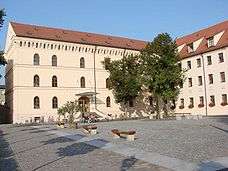
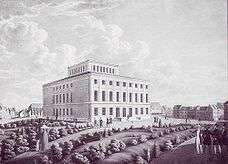
In the 17th and 18th centuries the universities were centers of the German Enlightenment. Christian Wolff was an important proponent of rationalism. He influenced many German scholars, such as Immanuel Kant. Christian Thomasius was at the same time the first philosopher in Germany to hold his lectures not in Latin, but German. He contributed to a rational programme in philosophy but also tried to establish a more common-sense point of view, which was aimed against the unquestioned superiority of aristocracy and theology.
The institutionalisation of the local language (German) as the language of instruction, the prioritisation of rationalism over religious orthodoxy, new modes of teaching, and the ceding of control over their work to the professors themselves, were among various innovations which characterised the University of Halle, and have led to its being referred to as the first "modern" university, whose liberalism was adopted by the University of Göttingen about a generation later, and subsequently by other German and then most North American universities.[1]
The University of Wittenberg was closed in 1813 during the Napoleonic Wars. The town of Wittenberg was granted to Prussia in the Congress of Vienna in 1815, and the university was then merged with the Prussian University of Halle in 1817. It took its present name on 10 November 1933.
Nazi period
More than a dozen professors were expelled. Others were shifted to Halle-Wittenberg from universities regarded as "better" at the time, which led to the university being called an academic Vorkuta – after the largest center of the Gulag camps in European Russia).
Faculties
Following the continental European academic tradition, MLU has 9 faculties, regrouping academic staff and students according to their field of studies (as opposed to the Anglo-Saxon collegiate university model):
- Faculty of Theology
- Faculty of Law and Economics
- Faculty of Medicine
- Faculty of Philosophy I (Social and Cultural Studies, History)
- Faculty of Philosophy II (Ancient and Modern Languages, Communication Studies, Music)
- Faculty of Philosophy III (Peadagogy)
- Faculty of Natural Sciences I (Biochemistry, Biology, Pharmacy)
- Faculty of Natural Sciences II (Physics and Chemistry)
- Faculty of Natural Sciences III (Agriculture, Geology, Mathematics, Computer Science)
Points of interest
- The Botanical Garden of Martin Luther University of Halle-Wittenberg, founded in 1698.
- MLU's historical observatory, built in 1788 by Carl Gotthard Langhans.
Cooperating research institutions
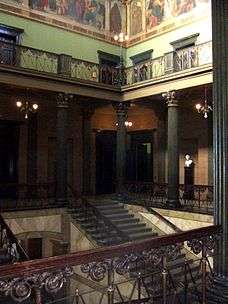
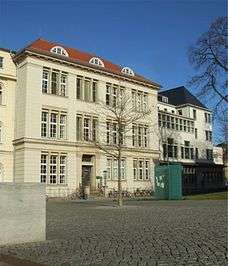
MLU is enclosed by a variety of research institutions, which have either institutional or personal links with the university or cooperate occasionally in their respective fields of studies:
- The German Academy of Sciences Leopoldina
- The Halle Institute for Economic Research
- The Fraunhofer Institute for Mechanics of Materials
- The Leibniz Institute of Agricultural Development in Central and Eastern Europe
- The Leibniz Institute of Plant Biochemistry
- The Max Planck Research Unit for Enzymology of Protein Folding
- The Max Planck Institute for Social Anthropology
- The Max Planck Institute for Microstructure Physics
- The Helmholtz Centre for Environmental Research
Collegium musicum
Even though MLU is an academic, research oriented institution, not an academy of music or conservatory, the university has an academic orchestra, founded in 1779, and a rather prestigious[2] choir, founded in 1950, which together constitute the so-called Collegium musicum. Members are mostly gifted students of all faculties, but also academic staff and alumni. The university choir regularly performs at the international Handel Festival in George Frideric Handel’s birthplace, Halle.
Partner universities
MLU has many international partner universities, including:
- Argentina: National University of La Plata
- Australia: University of Queensland
- Austria: Johannes Kepler University Linz
- Canada: University of Ottawa
- Colombia: National University of Colombia and University of Atlántico
- China: Beijing University of Chemical Technology
- Czech Republic: Department of Musicology of Palacký University Faculty of Philosophy
- France: Charles de Gaulle University - Lille III, Paris X University Nanterre
- Hungary: University of Szeged
- India: Jawaharlal Nehru University, New Delhi
- Israel: Tel Aviv University, Ben-Gurion University of the Negev, Bar-Ilan University
- Italy: University of Palermo, University of Pisa, University of Naples Federico II
- Japan: Senshu University, Sophia University, Waseda University, Keio University
- Mauritius: University of Mauritius
- Mongolia: National University of Mongolia
- Peru: National University of San Marcos
- Poland: University of Gdańsk, Silesian University of Technology, Jan Kochanowski University, Adam Mickiewicz University in Poznań, Poznan University of Medical Sciences
- Romania: Babeş-Bolyai University
- Russia: M.V. Lomonosov Moscow State University, Moscow City Pedagogical University, Smolensk Humanitarian University, Bashkir State University, Voronezh State University, Joint Institute for Nuclear Research Dubna
- Slovakia: Comenius University in Bratislava, Slovak University of Technology in Bratislava
- Spain: University of Alcalá
- South Africa: University of Pretoria, Stellenbosch University
- South Korea: Hanbat National University
- Syria: University of Damascus, Arab International University
- United States: University of South Carolina, University of Alabama, University of Florida, Illinois Institute of Technology.
Notable scholars
_16.jpg)
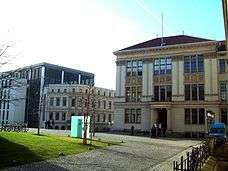
Given the history[3] and reputation[4] of the Martin Luther University of Halle-Wittenberg, numerous notable personalities attended the institution, such as Nobel laureates Emil Adolf von Behring, Gustav Ludwig Hertz, Hermann Staudinger and Karl Ziegler, as well as Anton Wilhelm Amo (the first colored Sub-Saharan African known to have attended a European university), Dorothea Erxleben (the first female medical doctor in Germany), Henry Melchior Muhlenberg, the Patriarch of the Lutheran Church in America, and his son, Frederick Muhlenberg (the first Speaker of the House of Representatives of the United States), Hans Dietrich Genscher (Germany’s longest serving Foreign Minister and Vice Chancellor), and:
- A: Thomas Abbt, Otto Ferdinand von Abensberg und Traun, Hermann Abert, Erasmus Alberus, Anton Wilhelm Amo, Nicolaus von Amsdorf, Abraham Angermannus, Johann Arndt, Ludwig Achim von Arnim, Gottfried Arnold, Gustav Aschaffenburg, Matthäus Aurogallus,
- B: Wilhelm Friedemann Bach, Johann Bachstrom, Ernst Gottfried Baldinger, Caspar Bartholin the Elder, Anton de Bary, Karl Adolph von Basedow, Emil Adolf von Behring, August Immanuel Bekker, Gottfried Bernhardy, Julius Bernstein, Willibald Beyschlag, Jan Blahoslav, Friedrich Blass, Philipp August Böckh, Julius Oscar Brefeld, Barthold Heinrich Brockes, Heinrich Brandt, Theodor Brugsch, Giordano Bruno, Ernest I, Duke of Brunswick-Lüneburg, Johann Franz Buddeus, Johann Christian Buxbaum,
- C: Joachim Camerarius, Johann Heinrich Callenberg, Georg Cantor, Martin Chemnitz, Bob Chi, Hermann Cohen, Alexander Conze, Valerius Cordus, Caspar Cruciger the Younger, Caspar Cruciger the Elder, Johann Crüger,
- D: Friedrich Christoph Dahlmann, Daniel Dahm, Richard Walther Darré, Friedrich Dedekind, Christoph Demantius, Gábor Döbrentei, Johann Gabriel Doppelmayr, Friedrich Ernst Dorn, Ernst Dümmler, Maximilian Wolfgang Duncker, Kurt Diebner,
- E: Johann August Eberhard, Martin Eichler, Johann Sigismund Elsholtz, Karl Elze, Francisco de Enzinas, Johann Eduard Erdmann, Johann August Ernesti, Johann Samuel Ersch, Dorothea Erxleben,
- F: Justus Falckner, Georg Forster, August Hermann Francke, Georg Franck von Franckenau, Bengt Gottfried Forselius, Christopher Marlowe's Doctor Faustus (in fiction)
- G: Nicolaus Gallus, Hans Dietrich Genscher, Scipione Gentili, Johann Gerhard, Paul Gerhardt, Wilhelm Gesenius, Heinrich Ernst Ferdinand Guericke, Albrecht Giese, Johann Wilhelm Ludwig Gleim, Rudolph Goclenius, Johann Nikolaus Götz, Alfred Carl Graefe, Friedrich Albrecht Carl Gren, Johann Jakob Griesbach, Julius Waldemar Grosse, Johann Gottfried Gruber, Gottlieb Sigmund Gruner, Jan Gruter, Simon Grynaeus, Erich Gutenberg,
- H: Johann Habermann, Monika Harms, Horatio Balch Hackett, Rudolf Haym, Rudolf Heidenhain, Hermann Theodor Hettner, Friedrich Heinrich von der Hagen, Patrick Hamilton (martyr), Georg Frideric Handel, William Shakespeare’s Hamlet (in fiction), Gottlieb Christoph Harless, Christian August Hausen, Sven Hedin, Christian Friedrich Henrici, Gustav Ludwig Hertz, Christian Gottlob Heyne, Adolf Bernhard Christoph Hilgenfeld, Ferdinand Hitzig, Erich Hoffmann, Anton Ludwig Ernst Horn, Eugen Huber, Gottlieb Hufeland, Gustav Hugo, Nicolaus Hunnius, Hermann Hupfeld, John Fletcher Hurst, Edmund Husserl, Leonhard Hutter,
- I: Karl Leberecht Immermann, Nitobe Inazō,
- J: Friedrich Ludwig Jahn, Ludwig Heinrich von Jakob, Jeremiah Jenks, Jan Jesenius,
- K: Saul Isaac Kaempf, Andreas Karlstadt, Karl Wilhelm Gottlob Kastner, Bartholomäus Keckermann, Petrus Kenicius, Karl-Hermann Knoblauch, Ernst Kohlschütter,
- L: Heinrich Laube, Johann Gottlob Lehmann, Heinrich Leo, Edwin Linkomies, Christian Lobeck, Otto Heinrich von Löben, Johann Carl Gottfried Loewe, Valentin Ernst Löscher, Karl August Lossen, Gottfried Christian Friedrich Lücke, Martin Luther, Paul Luther, Cyprián Karásek Lvovický of Lvovice,
- M: Lucas Maius, Johann Friedrich Meckel, Johann David Michaelis, Gustav Mie, Friedrich de la Motte Fouqué, Friedrich Mohs, Joachim Mrugowsky, Julius Müller, Lucian Müller, Frederick Muhlenberg, Henry Muhlenberg,
- N: Johann August Nauck, August Neander, Michael Neander, Felix von Niemeyer, Benedikt Niese, Karl Immanuel Nitzsch,
- O: Adam Gottlob Oehlenschläger,
- P: Peter Simon Pallas, Simon Patten, Christiaan Hendrik Persoon, Jöran Persson, Olaus Petri, Caspar Peucer, Julius Plücker, August Pott, Johannes Praetorius, Edmond de Pressensé, Robert Prutz,
- Q: Johannes Andreas Quenstedt,
- R: Karl Wilhelm Ramler, Werner Rauh, Friedrich Ludwig Georg von Raumer, Ernst Raupach, Hermann Samuel Reimarus, Erasmus Reinhold, Johann Jakob Reiske, Julius Reubke, Edouard Guillaume Eugène Reuss, Peter Riedel, Eduard Karl August Riehm, Albrecht Ritschl, Lars Roberg, Johann Karl Friedrich Rosenkranz, David Ruhnken,
- S: Friedrich Carl von Savigny, Nikolaus Selnecker, Johann Salomo Semler, Daniel Sennert, Philip Schaff, Max Scheler, Valentin Schindler, Diederich Franz Leonhard von Schlechtendal, Friedrich Daniel Ernst Schleiermacher, August Ludwig von Schlözer, Franz Hermann Schulze-Delitzsch, Max Schultze, Karl Schwarz, Veit Ludwig von Seckendorff, George Spalatin, Philipp Jakob Spener, Oswald Spengler, Walther Spielmeyer, Curt Polycarp Joachim Sprengel, Georg Ernst Stahl, Hermann Staudinger, Emmanuel Steinschneider, Henrik Steffens, Martin Stephan, Rudolf Ewald Stier, Count Friedrich Leopold zu Stolberg, Johann Friedrich Struensee, Aleksandras Stulginskis, Carl Stumpf, Annette Schmiedchen, Stuart Parkin
- T: Friedrich Tholuck, Christian Thomasius, Ludwig Tieck, Jiří Třanovský, Daniel Gottlob Türk
- U: Hermann Ulrici, Dimitri Uznadze,
- V: Karl August Varnhagen von Ense, Abraham Vater, Daniel Vorländer, Hugo Marie de Vries,
- W: Wilhelm Eduard Weber, Julius Wegscheider, Hermann Welcker, Julius Wellhausen, Joachim Westphal (of Hamburg), Carl Ludwig Willdenow, Johann Joachim Winckelmann, Friedrich August Wolf, Christian Wolff (philosopher), F. C. D. Wyneken,
- Z: Paul Zarifopol, Karl Ziegler, Nicolaus Ludwig Zinzendorf, Max Zorn, Leopold Zunz.
See also
Notes
- 1 2 Britannica Online
- ↑ In 2007, the "Johann Friedrich Reichardt University Choir", led by MLU’s musical director Jens Lorenz, was awarded the overall distinction "Gold – Excellent" in the "18th International Competition of Choral Music" in Verona, Italy for its performance with spiritual and secular a cappella works from the renaissance, baroque and romantic periods and the 20th century. In addition, the choir was awarded one of three special awards for the best interpretation of the compulsory piece "As Torrents in Summer" by Edward Elgar. Source: Martin Luther University (2008): MLU Yearbook 2007, p. 138
- ↑ Speler, Ralf-Torsten (2003): 'Die Martin-Luther-Universität Halle-Wittenberg', Erfurt: Sutton, ISBN 978-3-89702-482-3
- ↑ Due to rather homogeneous standards of teaching and research, German university rankings generally are far less significant than for many other countries. Nevertheless, for example, MLU’s faculty of economics outranks University of Heidelberg, the oldest (and often considered as the foremost) German university, in 13 of 19 tested categories, according to the 2007 survey of German Academic Exchange Service.
References
- The New Encyclopædia Britannica, 15th Edition. Chicago, 1988.
External links
- Official website
- Official website (German)
- Download MLU Yearbook 2007 (German) / (English)
Coordinates: 51°29′11″N 11°58′08″E / 51.48639°N 11.96889°E